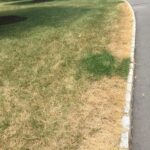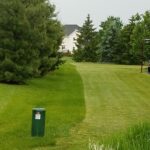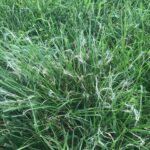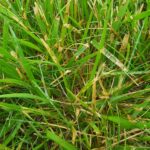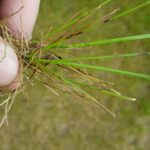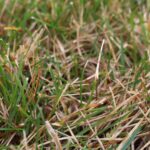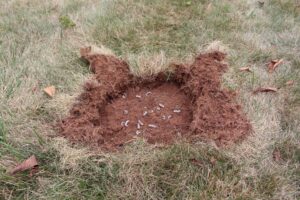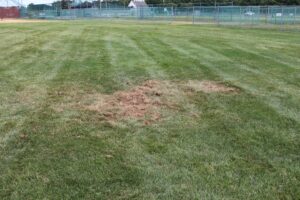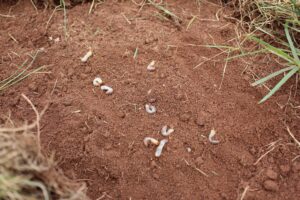Table of Contents
ToggleLast Updated on May 2, 2025
Maintaining a lawn can be difficult through the varying environmental and cultural factors we see here in New Jersey. For example, common mistakes with mowing and watering can greatly impact the health and appearance of your lawn. Below we have outlined some common mistakes homeowners make throughout the summer months and what can be done to correct them.
-
Watering incorrectly
What are good watering practices? Well, it is often dependent on what type of summer we are experiencing. The past two years have been record breaking in the amount of rainfall received. This year our summer has started out pretty dry! If your lawn is experiencing drought stress, setting up sprinklers correctly is very important. The best time to water your lawn is between 12 am to 6 am – yes, when you are sleeping. This minimizes water loss from evaporation and allows the moisture to penetrate deeper into the soil. It also reduces the risk of getting disease because we are watering when the grass blades are already wet from dew formation. You can learn more about lawn disease by clicking this link. (Insert link to disease blog please not sure if it’s posted)
When watering with an underground irrigation system, have your system set to run 1 – 1 ½ hours twice a week. If you have hose-end sprinklers, we recommend purchasing a valve timer and setting your sprinkler to run for 2 hours, twice per week. These run times are a great starting point, but you will need to make adjustments based on the layout of your property (full sun vs shade) and more importantly, the weather. For example, this year the weather has been very hot and dry so run times should be increased to minimize stress and keep plants healthy.
Check out more information about a lawn watering schedule here.
-
Mowing the grass too short
In the spring and summer months, healthy grass grows fast! It might seem tempting to mow your grass short to decrease mowing frequency; however, mowing the grass too short can have an impact on the health and appearance of your lawn. The best mowing height in our service area is about 3 – 3 ½ inches in length. When mowing the lawn, only cut 1/3 of the grass plant at a time. Removing too much of the grass blade at one time can weaken the plant and reduce its ability to withstand other environmental issues such as disease and insects.
-
Mowing the grass with dull blades
Mowing damage from dull blades is common and easily avoidable. Have the mower blades sharpened regularly to avoid frayed grass blades. Dull blades can tear, shred, and bruise the ends of the grass plants, this weakens the plant and makes an excellent spot for disease to start.
-
Not treating disease with fungicides
There are many types of turf diseases, some are only cosmetic while others can rapidly kill the turf in a short period of time. If there is disease present on your lawn, it’s critical to identify it first so you can understand the potential issues as well as treatment options. For diseases that cause significant damage, like brown patch and leaf spot, applying a fungicide when the disease first emerges can save the health of the rest of your turf. Applying fungicides after the disease is present stops the disease from spreading. By skipping the fungicide, disease can spread through your whole lawn causing large areas of dead turf. For people with disease issues year after year, a preventative fungicide application may be recommended. Speak to a lawn care professional if this is the case.
-
Skipping grub control
Grubs cause substantial damage to lawns in our area annually. Beetles lay their eggs in the soil and eventually the eggs hatch into grubs, which survive by eating plant roots. Over time, as the larvae continue to feed, areas of the lawn turn brown and feel sponge like as you walk over them. When examining your lawn, if grubs are present, the grass will pull up like a carpet and often you will see the grubs underneath the surface. To avoid grub damage, there is a preventative treatment you can apply to the lawn in the summer.
An ounce of prevention is worth a pound of cure! The treatment for controlling larger grubs is much more expensive and because the grubs are more mature, it’s not as effective either. In addition, most areas damaged by grubs will need to be reseeded to establish new turf. If you’re thinking about skipping the grub control application to save money, you may want to reconsider!
Conclusion
These common lawn care mistakes can be rectified and in turn help the overall health and appearance of your lawn! If you are in our service area, and have any questions about the information provided above, please give our office a call to discuss.

